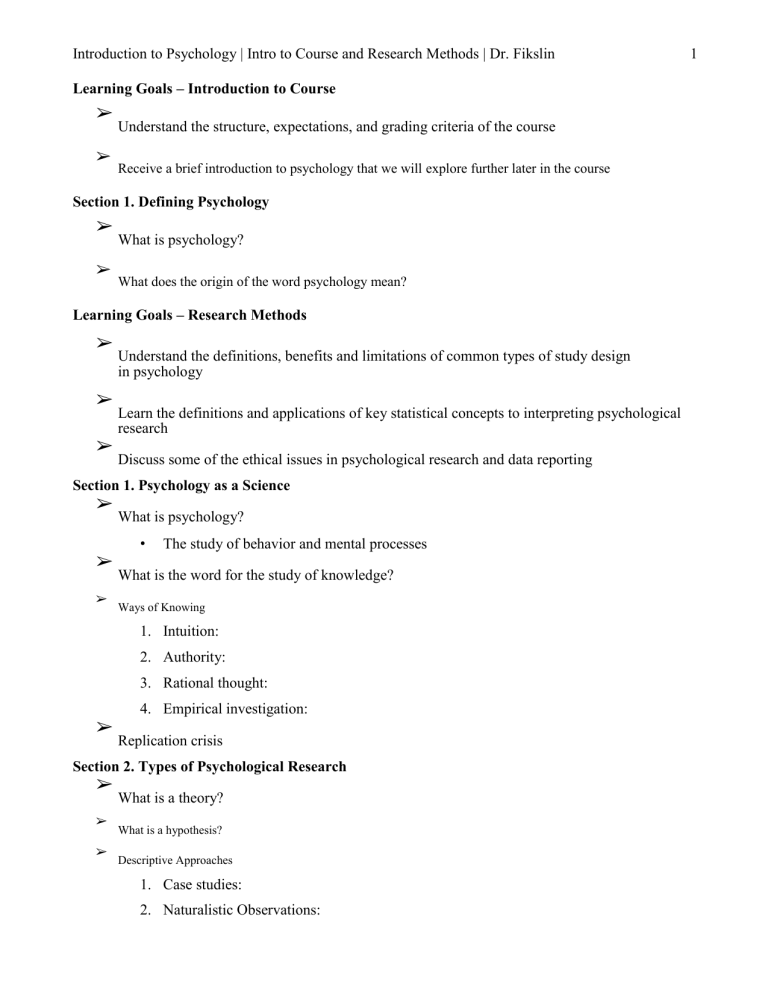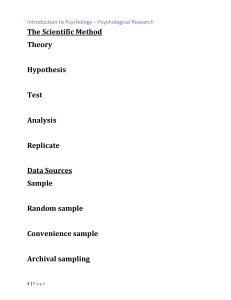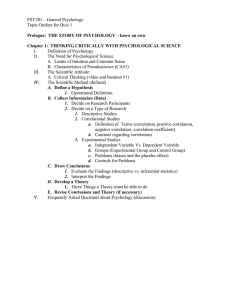Intro to Psychology Lecture Notes: Course & Research Methods
advertisement

Introduction to Psychology | Intro to Course and Research Methods | Dr. Fikslin Learning Goals – Introduction to Course ➢ ➢ Understand the structure, expectations, and grading criteria of the course Receive a brief introduction to psychology that we will explore further later in the course Section 1. Defining Psychology ➢ ➢ What is psychology? What does the origin of the word psychology mean? Learning Goals – Research Methods ➢ ➢ ➢ Understand the definitions, benefits and limitations of common types of study design in psychology Learn the definitions and applications of key statistical concepts to interpreting psychological research Discuss some of the ethical issues in psychological research and data reporting Section 1. Psychology as a Science ➢ What is psychology? • ➢ ➢ The study of behavior and mental processes What is the word for the study of knowledge? Ways of Knowing 1. Intuition: 2. Authority: 3. Rational thought: 4. Empirical investigation: ➢ Replication crisis Section 2. Types of Psychological Research ➢ ➢ ➢ What is a theory? What is a hypothesis? Descriptive Approaches 1. Case studies: 2. Naturalistic Observations: 1 3. Surveys: ➢ What is random sampling and why is it important? Introduction to Psychology | Intro to Course and Research Methods | Dr. Fikslin ➢ 2 Correlational Approach 1. What does a correlation measure? 2. How do you interpret a correlation coefficient? ▪ ▪ ➢ Strength of association Positive vs negative correlation Experimental Approach 1. What makes an experiment an experiment? 2. Experimental variables ▪ ▪ Independent variable: Dependent variable: 3. What is random assignment? 4. What is a confound? 5. Features of good experiments Section 3. Science and good experiments ➢ ➢ ➢ Why do we have faith in science? Features of good experiments • Control condition • Blind and double-blind participation • Replication • External validity Interpreting descriptions of research • How do you know if a study is correlational or experimental study based on how researchers describe relationships between variables? ➢ What is an example of a psychological research question you have and how would you explore that relationship using a correlational versus an experimental study? Section 4. Data Analysis & Reporting ➢ Central tendency 1. Mean: 2. Median: 3. Mode: ➢ ➢ What is standard deviation? Inferential statistics Introduction to Psychology | Intro to Course and Research Methods | Dr. Fikslin 1. What is statistical significance? 2. What does p < .05 mean? Section 5. Research Ethics ➢ ➢ Ethical presentation of data Preventing unethical science 1. Institutional Review Board 2. Informed consent 3. Protection of those who cannot give consent ➢ What does WEIRD stand for and how is psychology WEIRD? How does this influence the quality of psychological science? 3





